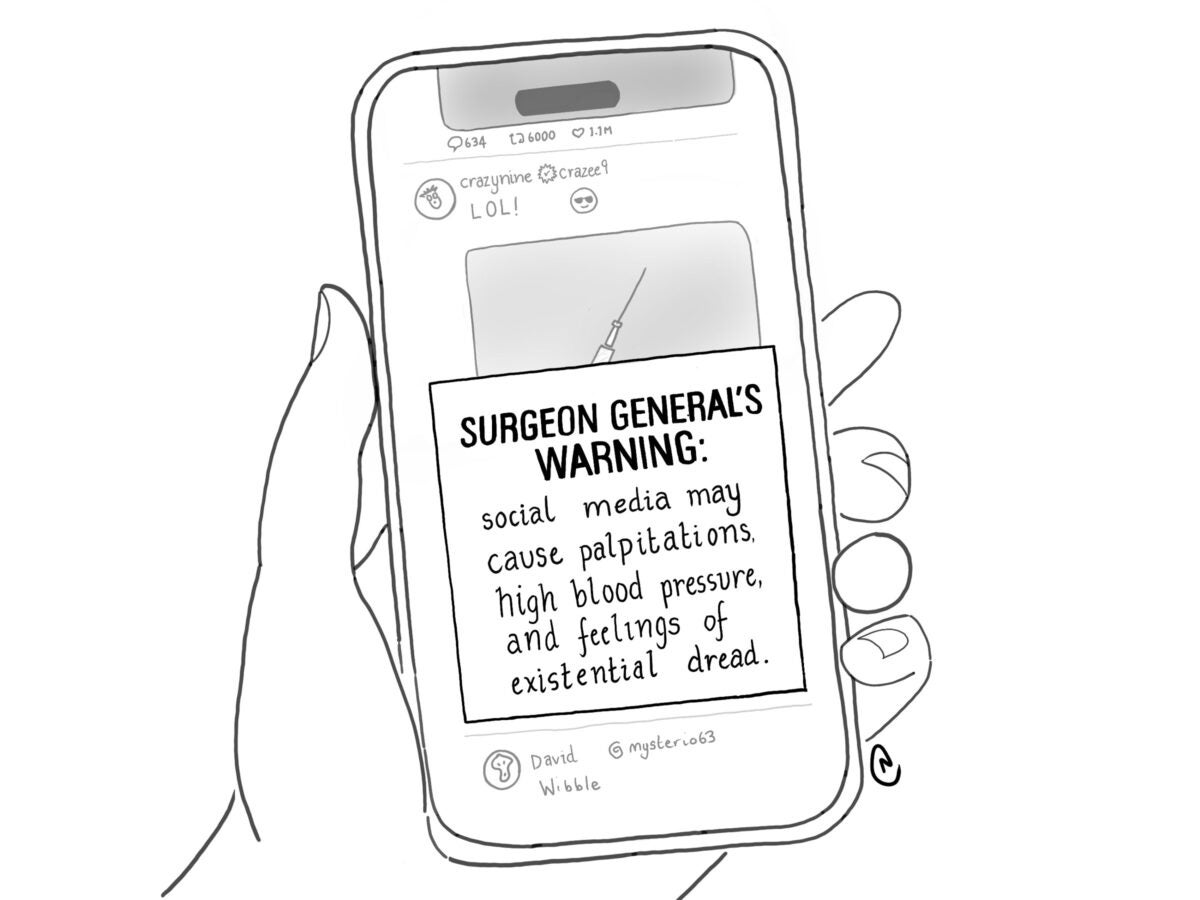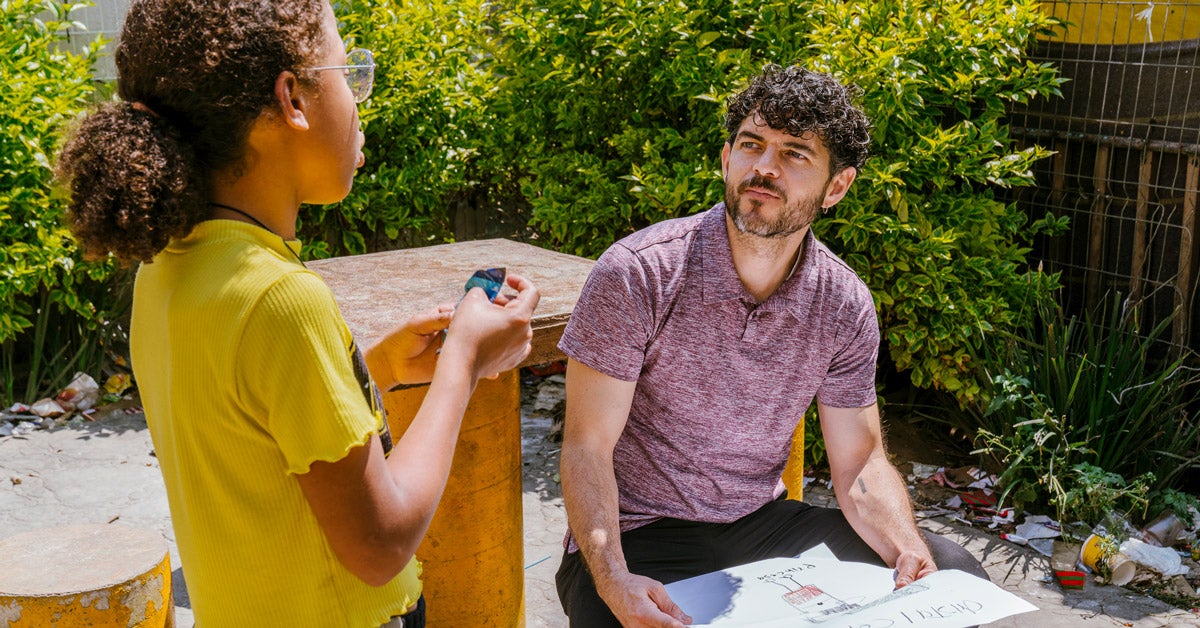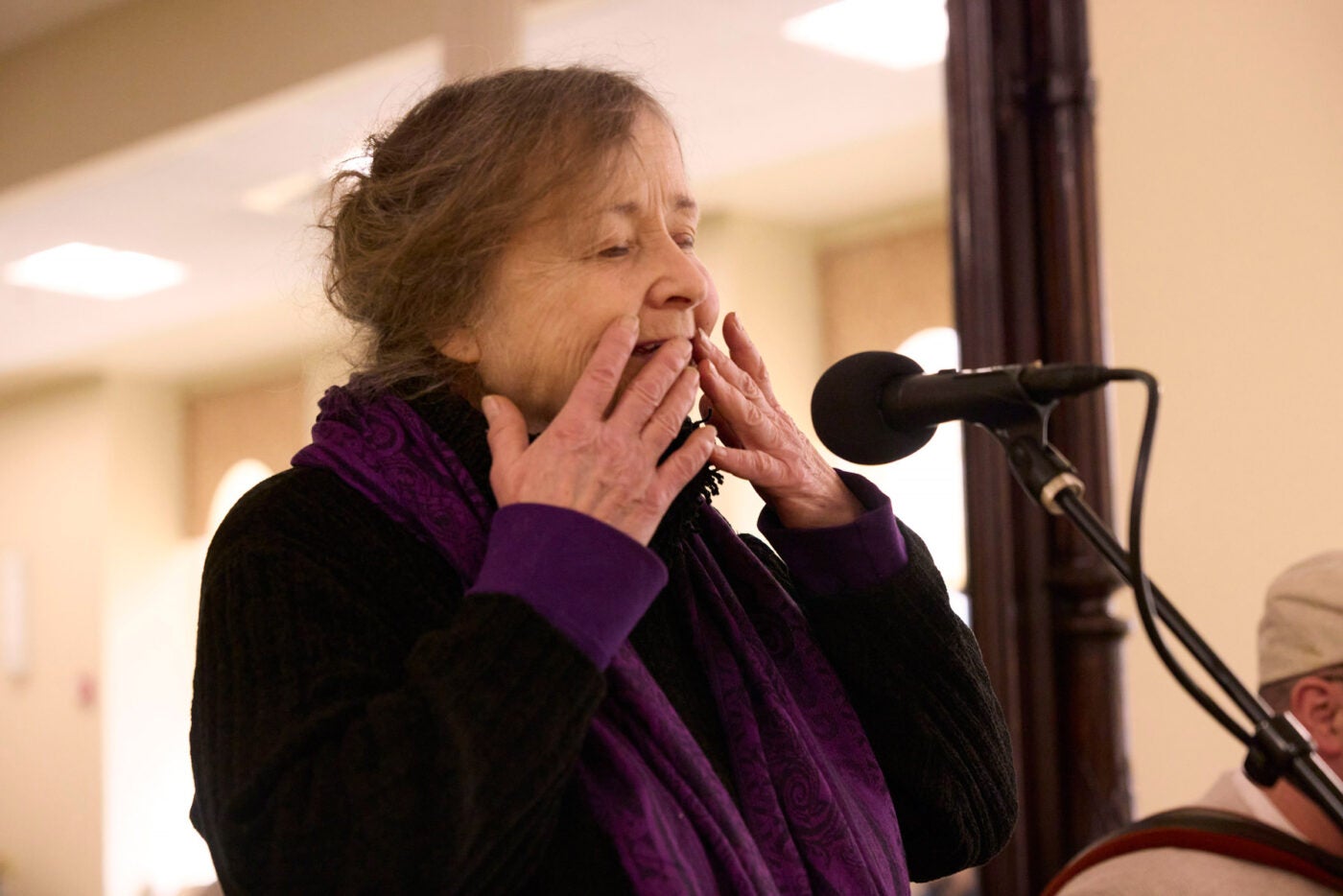
Feature
Exploring the connection between music and mental health
After Joy Chesna retired, she grappled with feelings of loneliness. These became more intense, she says, after old friends died and as her husband’s health problems worsened. The COVID-19 pandemic made things even worse as panic seemed to envelop her community. “I wasn’t frightened of the COVID,” Chesna says, “I was frightened of the fear that was all around me.”
As Chesna’s mental health stress lingered, a friend who knew she enjoys singing wanted to cheer her up and sent Chesna a Zoom link to join a virtual open mic hosted by Tunefoolery. The Boston-area nonprofit organization provides paid musical gigs for people who have experienced mental illness and other mental distress. Not long after that open mic, Chesna, who lives in Boston, joined the musicians’ organization, and today the 76-year-old sings regularly as part of Tunefoolery’s roster, bringing Broadway showtunes, old Cole Porter standards, and tangos to places like nursing homes and hospitals.
She loves when her audiences join in on the choruses of her favorite musicals. And Chesna says Tunefoolery helped her overcome her loneliness. She’s even fulfilled a long-dormant dream of performing with an accordion accompanist. “The big dream was to sing with an accordion on the streets of Paris,” she says with a laugh. “I got the accordion. Maybe later, Paris?”
Sign up for Harvard Public Health
Delivered to your inbox weekly.
About 150 musicians have been part of Tunefoolery, which turns 30 this year. It was originally developed in line with the clubhouse model, which uses a psychosocial rehabilitation approach to help individuals regain a place in their community. In the clubhouse model, participants are referred to as “members;” provided with paid work opportunities, and have free use of a drop-in center. The approach creates “a therapeutic environment” where people who join are valued club members, says Francesca Pernice, a psychologist at Wayne State University who studies the clubhouse model.
Research has shown clubhouse participants have lower rates of rehospitalization and report higher quality of life and better social relationships.
But clubhouses are challenging to operate, despite their track record, because they don’t fit easily in the fee-for-service payment model. Tunefoolery stopped being part of a clubhouse in 2008, when it had to move after state budget cuts caused the closure of its original home, the Cambridge-Somerville Social Club.
Pernice says Tunefoolery’s continued success suggests there is opportunity to adapt the clubhouse model “to innovate and change some systems of care.” The organization found a new home at the Boston University Medical Campus, with rehearsal space, offices, and a recording studio. Tunefoolery hosts community open mic events there, too, though most of its performances take place elsewhere in Greater Boston; the group even provides transportation for some musicians to get to the shows.
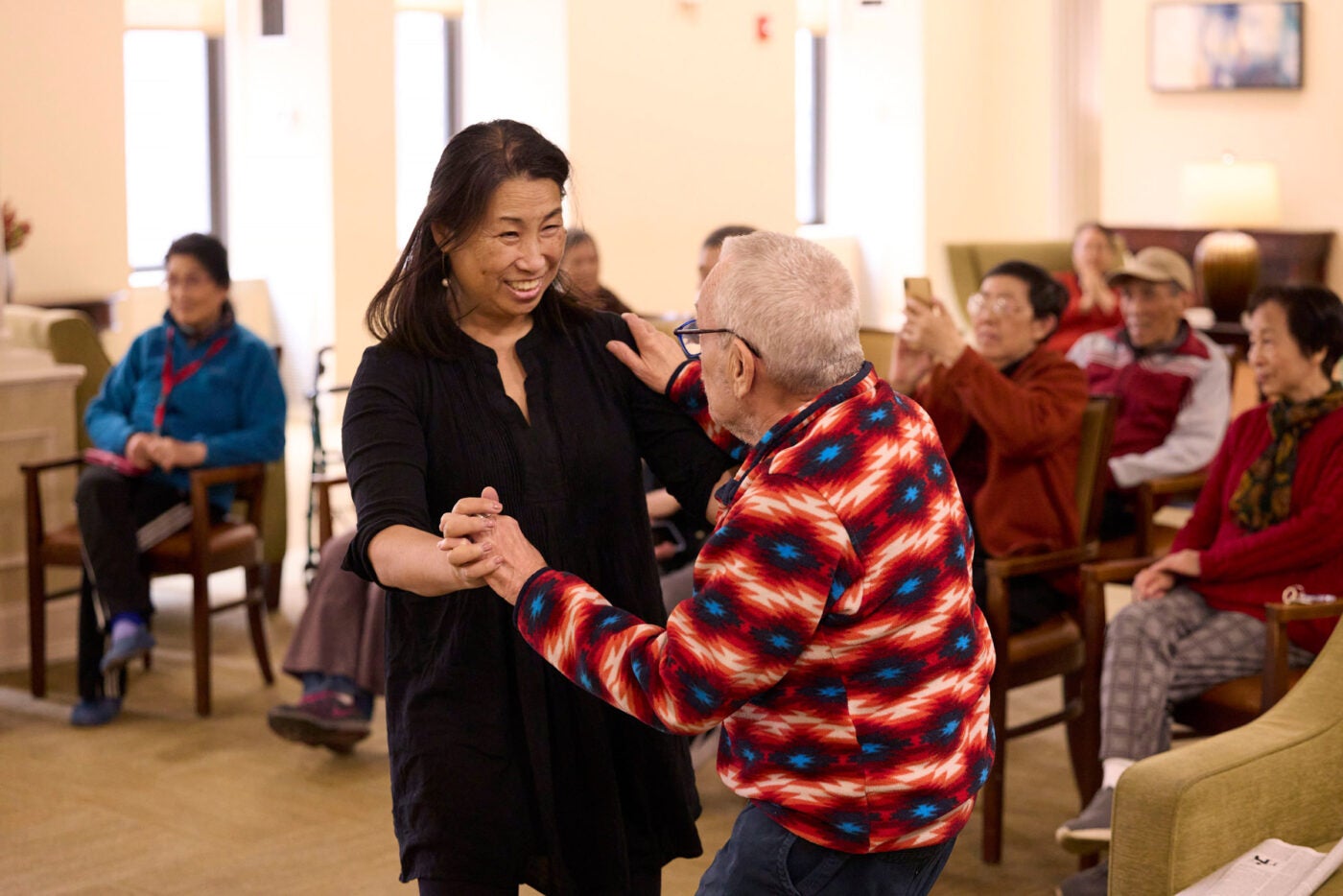
Linda Chin, creative director at Tunefoolery, dances with spectators at a recent performance in Boston.
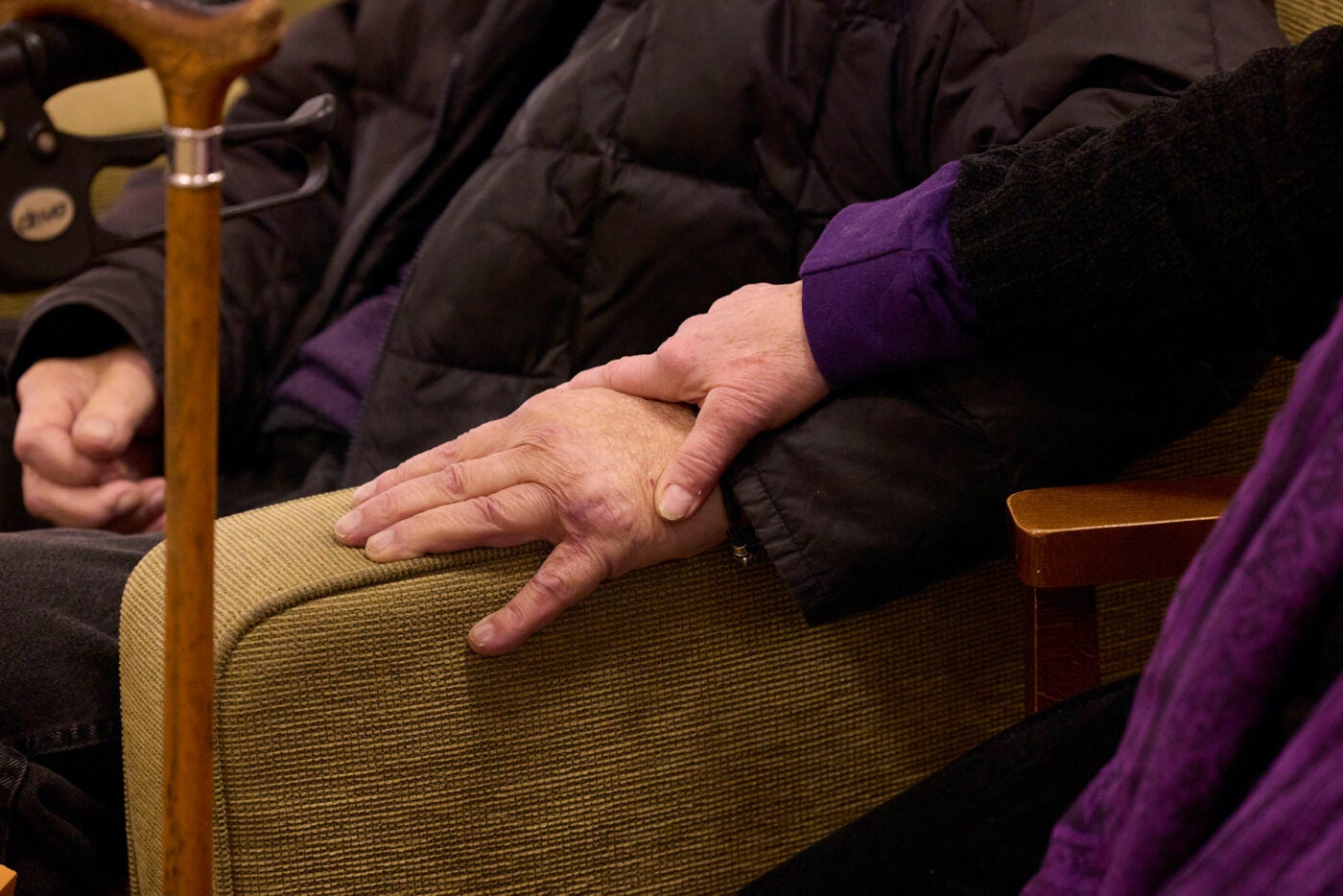
Joy Chesna and her husband, Edmond, hold hands at a recent Tunefoolery event in Boston.
It still follows some of the clubhouse model’s practices—clubhouse facilities often provide employment to members who serve as organizers or cleaning staff, and Tunefoolery pays for musical gigs, through individual donations, grants, and performance fees. Participants are not called “patients” to reduce stigma; Tunefoolery members are simply musicians. “When musicians join the organization, they are comfortable with their identity as a musician in mental health recovery, but we do not ask people their medical histories,” says Linda Chin, Tunefoolery’s creative director. “It’s not a requirement, nor something that I know, as a director.”
Musicians looking to join Tunefoolery are screened, however, to ensure they are a good fit for the organization. There are roughly 25 active musicians on its roster; they are well past the beginning stages of recovery and have achieved the stability needed to perform. Musicians, who can range in skill level from amateur to professional, audition to demonstrate their aptitude.
Harrison Huang says playing the organization’s gigs provides benefits he wouldn’t get in more conventional performances. Huang is a senior at Middlesex School, a private college preparatory school in Concord, Massachusetts, and also a pianist with a fondness for Romantic composers like Franz Liszt. He learned about Tunefoolery when researching the intersection of music and mental health, looking for inspiration for a friend suffering from some mental health challenges. He invited Tunefoolery performers to visit his school last spring, and then he worked as a summer intern for the group.
He is a Tunefoolery supporter rather than a member, but his connection has also helped him cope with academic pressure since, as a boarding student from Nanjing, China, he has no family nearby. Huang says he felt overwhelmed at first with the adjustment of living in the U.S. Playing with other Tunefoolery musicians, he explains, has been particularly helpful. He says playing music together with others “is a really amazing experience—establishing that connection, working together, and seeing how we are taking that stress off our lives at the same time.”
Hear Harrison Huang perform “Hungarian Rhapsody #2” by Franz Liszt:
Chin has been encouraging more musical collaborations and even the creation of ensembles among Tunefoolery performers. She says that watching the musicians perform for audiences who are currently being treated for mental illness has been gratifying to witness. “That, in itself, is extraordinary,” Chin says. “That they have the courage and the resilience to go back and give these gifts back to other individuals that are struggling.”
For Tunefoolery musician Lou Mace Binswanger, who goes by the name “Lou Mace,” those kinds of performance have been especially meaningful.
At age 20, Lou Mace began experiencing manic episodes that led to a bipolar diagnosis and some intensive in-patient treatment. Lou Mace, who identifies as nonbinary and uses they/them pronouns, recalls feeling overwhelmed by the barrage of doctors and specialized care they encountered. They say that during their recovery, they longed for someone who could relate to what they were going through.
“I feel like the phrase that I wanted to hear the most was just ‘me too,’ or ‘I understand,’ or ‘I’ve experienced the same thing,’” they recall. “And that’s not something that I heard until I started connecting with others, through the people I met in treatment and through Tunefoolery.”
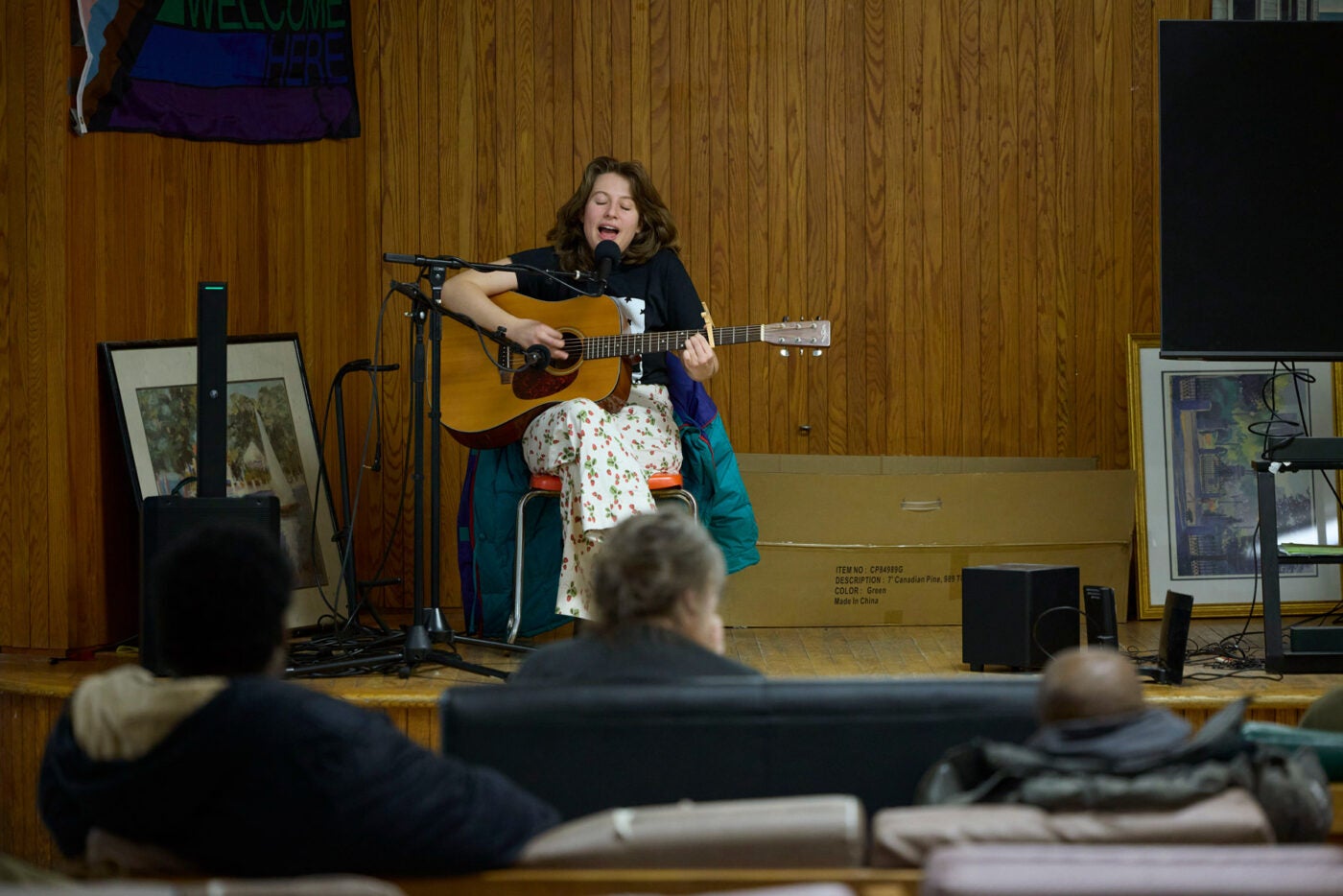
Lou Mace performs at a recent Tunefoolery event in Boston.
Hear Lou Mace perform “The Wolves,” an original song:
Today, five years later, Lou Mace is in a better place mentally. They live in Boston’s Allston neighborhood and work as a peer support counselor. Since joining Tunefoolery, they have also been writing original rock and folk songs, many of which express the frustrations and misunderstandings that they have experienced living with and being treated for mental illness. They say performing these songs for audiences in psychiatric wards has been particularly rewarding.
“I do feel inherently connected to the people that I’m performing for in a hospital because I know exactly what it’s like to be there,” they say. “It’s nice to feel that I can be entertaining but that I could also be healing.”
Top image: Joy Chesna performs with Tunefoolery recently in Boston.
Republish this article
<p>The clubhouse model goes musical.</p>
<p>Written by Alex Smith</p>
<p>This <a rel="canonical" href="https://harvardpublichealth.org/mental-health/exploring-the-connection-between-music-and-mental-health/">article</a> originally appeared in<a href="https://harvardpublichealth.org/">Harvard Public Health magazine</a>. Subscribe to their <a href="https://harvardpublichealth.org/subscribe/">newsletter</a>.</p>
<p class="has-drop-cap">After Joy Chesna retired, she grappled with feelings of loneliness. These became more intense, she says, after old friends died and as her husband’s health problems worsened. The COVID-19 pandemic made things even worse as panic seemed to envelop her community. “I wasn’t frightened of the COVID,” Chesna says, “I was frightened of the fear that was all around me.”</p>
<p>As Chesna’s mental health stress lingered, a friend who knew she enjoys singing wanted to cheer her up and sent Chesna a Zoom link to join a virtual open mic hosted by Tunefoolery. The Boston-area nonprofit organization provides paid musical gigs for people who have experienced mental illness and other mental distress. Not long after that open mic, Chesna, who lives in Boston, joined the musicians’ organization, and today the 76-year-old sings regularly as part of Tunefoolery’s roster, bringing Broadway showtunes, old Cole Porter standards, and tangos to places like nursing homes and hospitals.</p>
<p>She loves when her audiences join in on the choruses of her favorite musicals. And Chesna says Tunefoolery helped her overcome her loneliness. She’s even fulfilled a long-dormant dream of performing with an accordion accompanist. “The big dream was to sing with an accordion on the streets of Paris,” she says with a laugh. “I got the accordion. Maybe later, Paris?”</p>
<p>About 150 musicians have been part of Tunefoolery, which turns 30 this year. It was originally developed in line with the clubhouse model, which uses a psychosocial rehabilitation approach to help individuals regain a place in their community. In the clubhouse model, participants are referred to as “members;” provided with paid work opportunities, and have free use of a drop-in center. The approach creates “a therapeutic environment” where people who join are valued club members, says Francesca Pernice, a psychologist at Wayne State University who studies the clubhouse model.</p>
<p><a href="https://www.ncbi.nlm.nih.gov/pmc/articles/PMC5756274/">Research</a> has shown clubhouse participants have lower rates of rehospitalization and report higher quality of life and better social relationships. </p>
<p>But clubhouses are challenging to operate, despite their track record, because they don’t fit easily in the fee-for-service payment model. Tunefoolery stopped being part of a clubhouse in 2008, when it had to move after state budget cuts caused the closure of its original home, the Cambridge-Somerville Social Club. </p>
<p>Pernice says Tunefoolery’s continued success suggests there is opportunity to adapt the clubhouse model “to innovate and change some systems of care.” The organization found a new home at the Boston University Medical Campus, with rehearsal space, offices, and a recording studio. Tunefoolery hosts community open mic events there, too, though most of its performances take place elsewhere in Greater Boston; the group even provides transportation for some musicians to get to the shows.</p>
<p>It still follows some of the clubhouse model’s practices—clubhouse facilities often provide employment to members who serve as organizers or cleaning staff, and Tunefoolery pays for musical gigs, through individual donations, grants, and performance fees. Participants are not called “patients” to reduce stigma; Tunefoolery members are simply musicians. “When musicians join the organization, they are comfortable with their identity as a musician in mental health recovery, but we do not ask people their medical histories,” says Linda Chin, Tunefoolery’s creative director. “It’s not a requirement, nor something that I know, as a director.”</p>
<p>Musicians looking to join Tunefoolery are screened, however, to ensure they are a good fit for the organization. There are roughly 25 active musicians on its roster; they are well past the beginning stages of recovery and have achieved the stability needed to perform. Musicians, who can range in skill level from amateur to professional, audition to demonstrate their aptitude.</p>
<p>Harrison Huang says playing the organization’s gigs provides benefits he wouldn’t get in more conventional performances. Huang is a senior at Middlesex School, a private college preparatory school in Concord, Massachusetts, and also a pianist with a fondness for Romantic composers like Franz Liszt. He learned about Tunefoolery when researching the intersection of music and mental health, looking for inspiration for a friend suffering from some mental health challenges. He invited Tunefoolery performers to visit his school last spring, and then he worked as a summer intern for the group. </p>
<p>He is a Tunefoolery supporter rather than a member, but his connection has also helped him cope with academic pressure since, as a boarding student from Nanjing, China, he has no family nearby. Huang says he felt overwhelmed at first with the adjustment of living in the U.S. Playing with other Tunefoolery musicians, he explains, has been particularly helpful. He says playing music together with others “is a really amazing experience—establishing that connection, working together, and seeing how we are taking that stress off our lives at the same time.”</p>
<p class="is-style-t-caption"><em>Hear Harrison Huang perform “Hungarian Rhapsody #2” by Franz Liszt:</em></p>
<p>Chin has been encouraging more musical collaborations and even the creation of ensembles among Tunefoolery performers. She says that watching the musicians perform for audiences who are currently being treated for mental illness has been gratifying to witness. “That, in itself, is extraordinary,” Chin says. “That they have the courage and the resilience to go back and give these gifts back to other individuals that are struggling.”</p>
<p>For Tunefoolery musician Lou Mace Binswanger, who goes by the name “Lou Mace,” those kinds of performance have been especially meaningful.</p>
<p>At age 20, Lou Mace began experiencing manic episodes that led to a bipolar diagnosis and some intensive in-patient treatment. Lou Mace, who identifies as nonbinary and uses they/them pronouns, recalls feeling overwhelmed by the barrage of doctors and specialized care they encountered. They say that during their recovery, they longed for someone who could relate to what they were going through.</p>
<p>“I feel like the phrase that I wanted to hear the most was just ‘me too,’ or ‘I understand,’ or ‘I've experienced the same thing,’” they recall. “And that's not something that I heard until I started connecting with others, through the people I met in treatment and through Tunefoolery.”</p>
<p class="is-style-t-caption"><em>Hear Lou Mace perform “The Wolves,” an original song:</em></p>
<p>Today, five years later, Lou Mace is in a better place mentally. They live in Boston’s Allston neighborhood and work as a peer support counselor. Since joining Tunefoolery, they have also been writing original rock and folk songs, many of which express the frustrations and misunderstandings that they have experienced living with and being treated for mental illness. They say performing these songs for audiences in psychiatric wards has been particularly rewarding.</p>
<p class=" t-has-endmark t-has-endmark">“I do feel inherently connected to the people that I’m performing for in a hospital because I know exactly what it’s like to be there,” they say. “It’s nice to feel that I can be entertaining but that I could also be healing.”</p>
<script async src="https://www.googletagmanager.com/gtag/js?id=G-S1L5BS4DJN"></script>
<script>
window.dataLayer = window.dataLayer || [];
if (typeof gtag !== "function") {function gtag(){dataLayer.push(arguments);}}
gtag('js', new Date());
gtag('config', 'G-S1L5BS4DJN');
</script>
Republishing guidelines
We’re happy to know you’re interested in republishing one of our stories. Please follow the guidelines below, adapted from other sites, primarily ProPublica’s Steal Our Stories guidelines (we didn’t steal all of its republishing guidelines, but we stole a lot of them). We also borrowed from Undark and KFF Health News.
Timeframe: Most stories and opinion pieces on our site can be republished within 90 days of posting. An article is available for republishing if our “Republish” button appears next to the story. We follow the Creative Commons noncommercial no-derivatives license.
When republishing a Harvard Public Health story, please follow these rules and use the required acknowledgments:
- Do not edit our stories, except to reflect changes in time (for instance, “last week” may replace “yesterday”), make style updates (we use serial commas; you may choose not to), and location (we spell out state names; you may choose not to).
- Include the author’s byline.
- Include text at the top of the story that says, “This article was originally published by Harvard Public Health. You must link the words “Harvard Public Health” to the story’s original/canonical URL.
- You must preserve the links in our stories, including our newsletter sign-up language and link.
- You must use our analytics tag: a single pixel and a snippet of HTML code that allows us to monitor our story’s traffic on your site. If you utilize our “Republish” link, the code will be automatically appended at the end of the article. It occupies minimal space and will be enclosed within a standard <script> tag.
- You must set the canonical link to the original Harvard Public Health URL or otherwise ensure that canonical tags are properly implemented to indicate that HPH is the original source of the content. For more information about canonical metadata, click here.
Packaging: Feel free to use our headline and deck or to craft your own headlines, subheads, and other material.
Art: You may republish editorial cartoons and photographs on stories with the “Republish” button. For illustrations or articles without the “Republish” button, please reach out to republishing@hsph.harvard.edu.
Exceptions: Stories that do not include a Republish button are either exclusive to us or governed by another collaborative agreement. Please reach out directly to the author, photographer, illustrator, or other named contributor for permission to reprint work that does not include our Republish button. Please do the same for stories published more than 90 days previously. If you have any questions, contact us at republishing@hsph.harvard.edu.
Translations: If you would like to translate our story into another language, please contact us first at republishing@hsph.harvard.edu.
Ads: It’s okay to put our stories on pages with ads, but not ads specifically sold against our stories. You can’t state or imply that donations to your organization support Harvard Public Health.
Responsibilities and restrictions: You have no rights to sell, license, syndicate, or otherwise represent yourself as the authorized owner of our material to any third parties. This means that you cannot actively publish or submit our work for syndication to third-party platforms or apps like Apple News or Google News. Harvard Public Health recognizes that publishers cannot fully control when certain third parties aggregate or crawl content from publishers’ own sites.
You may not republish our material wholesale or automatically; you need to select stories to be republished individually.
You may not use our work to populate a website designed to improve rankings on search engines or solely to gain revenue from network-based advertisements.
Any website on which our stories appear must include a prominent and effective way to contact the editorial team at the publication.
Social media: If your publication shares republished stories on social media, we welcome a tag. We are @PublicHealthMag on X, Threads, and Instagram, and Harvard Public Health magazine on Facebook and LinkedIn.
Questions: If you have other questions, email us at republishing@hsph.harvard.edu.

